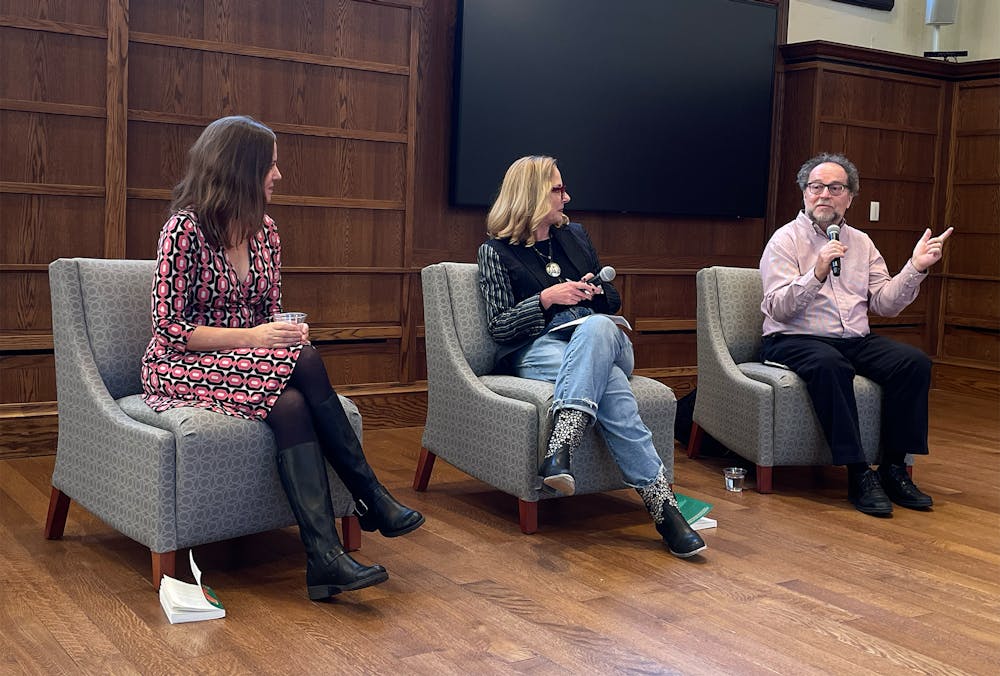“Why” is the question at the center of Freda Love Smith’s newest book, “I Quit Everything”— a difficult question which she acknowledges has no real answer. Smith’s book explores her struggles with addictive behavior, intoxication, and her past musical career.
Smith, a retired drummer for several indie rock bands, IU alumna and author, returned to IU to share excerpts from her newest book and answer questions at an event organized by the College of Arts and Humanities Institute at 4:30 p.m. Oct. 30 at Maxwell Hall.
Brenda Weber, director of the College of Arts and Humanities Institute, opened the event by welcoming the audience to the institute’s “Meet the Author” series. Weber also introduced her fellow moderator, Michael Leonard, an adjunct lecturer for the Media School.
Weber remarked on the impact Smith’s book had on her, having known Smith for almost eighteen years yet never fully understanding the extent of her struggles. She shared her admiration for Smith’s ability to turn her unhealthy cravings into art to help others.
Taking the podium, Smith was upfront about the nature of her book. Viewing it as a piece of self-inquiry, she said the book was more about asking herself questions about her own denial and withdrawal, not about reconciling every aspect of those things.
“It’s not a book of declarations,” Smith said. “It’s not full of ‘eureka moments.’ It’s not a book about me figuring it all out.”
The first excerpt Smith read traced her attempts to explore the influences of her childhood that led to her drinking, a problem that would see her enter rehab in her twenties. Smith noted influences from film, citing “Arthur,” “The Bad News Bears” and “Barfly” as some of the films that gave her a falsely positive view of drinking socially.
These films suggested to Smith that a relationship with alcohol could be a fun one and the lovable drunk is someone to laugh at or admire for not caring about the norms of society. This perceived quirky approach to drinking was something Smith juxtaposed with the realities of her drinking as she got older. Smith read aloud how the fun, drunken mingling clashed with blacking out, being sick and feeling ashamed of her behavior.
“Not only could alcohol change you, it could erase you,” Smith said.
As Smith continued to read select passages, her relaxed cadence and inflection made the large room feel intimate. Her writing — full of mid-sentence questions and occasionally fragmented sentences — felt conversational, akin to listening to a friend tell a story about their past.
Smith touched on the core of her book: the concept of quitting everything, a heavy task she undertook during the pandemic. For eight months, she quit one different addictive part of her life— like alcohol, caffeine, sugar, cannabis and social media. In removing these cravings from her life, Smith said she was surprised by how empty she felt.
“I quit everything, and it suddenly felt like nothing,” Smith said.
Despite the feeling of emptiness, in her reading Smith reinforced the power of being able to look outside one’s own vices to find one’ s true self. To conclude the reading, she joined Weber and Leonard in a moderated Q&A, talking about her writing process and what it was like to put the book together.
One of the key talking points of the Q&A was examining Smith’s writing process and her unique writing style which favored shorter and more direct sentences. Smith said this was a result of her musician days when she would write songs for her band.
“It would have to do a lot of work in three minutes and thirty seconds,” Smith said. “So, my experience was in that snapshot, vignette writing.”
To weave these shorter anecdotes together, Smith said that what sometimes seemed like separate stories would reveal themselves to have a common thread to pull them together, creating a more state-of-consciousness style of writing that felt more relaxed.
Weber and Leonard also asked Smith about the reactions she had gotten from people when they learned about her experiment. Smith said that the greatest reaction was from herself when she realized how much of her identity had been built around enjoying various addictive habits.
Responding to a question from the audience about her first draft, Smith said that her first draft was less open and vulnerable about her own feelings and experiences, hinting at deeper ideas rather than directly discussing them. She said that her friend’s feedback encouraged her to rewrite the draft to be more honest with herself and the readers.
“The book benefited from me being real and honest because of the kinds of things I was writing about. It was important for me to not hide.”




